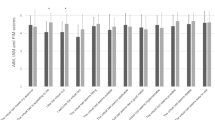Abstract
Little is known about what determines uptake and acceptability of internetbased treatments in eating disorders, and users’ experience with such treatments. We investigated these factors in participants of a randomized controlled trial of an internet-based cognitive- behavioural treatment (iCBT) package (Overcoming bulimia online). Nine participants were interviewed using purposive sampling. The content of interviews were analyzed using thematic analysis. Additionally, participants received questionnaires about their impressions of iCBT. Participants talked about their experience of using iCBT, its impact and compared it to other treatments. Questionnaire responses echoed themes identified in the interviews. iCBT was received positively as a way of fitting treatment into busy lives. Comments on the layout of some of the package content and the practitioner support offered were identified as areas that could be modified or improved.
Similar content being viewed by others
References
Schmidt U, Andiappan M, Grover M, et al. A randomised controlled trial of the effectiveness of a CDROM- based cognitive-behavioural self-care intervention for bulimia nervosa. Br J Psychiatry 2008; 193: 493–500.
Sánchez-Ortiz V, Munro C, Stahl D, et al. A randomised controlled trial of Internet-based Cognitive-Behavioural Therapy for Bulimia Nervosa or related disorders in a student population. Psychol Med 2010; 21: 1–11.
Pretorius N, Arcelus J, Beecham J, et al. Cognitivebehavioural therapy for adolescents with bulimic symptomatology: The acceptability and effectiveness of internet- based delivery. Behav Res Ther 2009; 47: 729–36.
Carrard I, Rouget P, Fernández-Aranda F, et al. Evaluation and deployment of evidence based patient self-management support program for Bulimia Nervosa. Int J Med Informatics 2006; 75: 101–9.
Fernández-Aranda F, Nunez A, Martinez C, et al. Internet-based cognitive-behavioural therapy for bulimia nervosa: A controlled study. Cyberpsychol Behav 2009; 12: 37–41.
Williams C, Aubin S, Cottrell D, et al. Overcoming bulimia: a self-help package. [Computer software]. Leeds, University of Leeds, 1998.
Perkins SJ, Murphy R, Schmidt U, et al. Self-help and guided self-help for eating disorders. Cochrane Database Syst Rev 2006; 4.
Schmidt U, Sánchez-Ortiz V. Self-help and healing narratives. In: Nasser M, Baistow K, Treasure J (Eds) The female body in mind. London, Routledge, 2007, pp 214–27.
Smith JA. Reflecting on the development of interpretative phenomenological analysis and its contribution to qualitative research in psychology. Qual Res Psychol 2004; 1: 39–54.
Musiat P, Schmidt U. Self-help and stepped care in eating disorders. In: Agras S (Eds) Oxford Handbook of Eating Disorders. Oxford, University Press, 2009, pp 386–401.
Banasiak SJ, Paxton SJ, Hay PJ. Perceptions of cognitive behavioural guided self-help treatment for bulimia nervosa in primary care. Eat Disord 2007; 15: 23–40.
Murray K, Pombo-Carril MG, Bara-Carril N, et al. Factors determining uptake of a CD-ROM-based CBT self-help treatment for bulimia: Patient characteristics and subjective appraisals of self-help treatment. Eur Eat Disord Rev 2003; 11: 243–60.
Mitchell N, Gordon PK. Attitudes towards computerized CBT for depression amongst a student population. Behav Cogn Psychother 2007; 35: 421–30.
Kaltenthaler E, Sutcliffe P, Parry G, et al. The acceptability to patients of computerized cognitive behaviour therapy for depression: a systematic review. Psychol Med 2008; 38: 1521–30.
Waller R, Gilbody S. Barriers to the uptake of computerized cognitive behavioural therapy: a systematic review of the quantitative and qualitative evidence. Psychol Med 2009; 24: 1–8.
Silverman D. Interpreting qualitative data (2nd Ed.). Thousand Oaks, CA, Sage Publications Ltd, 2001.
Braun V, Clarke V. Using thematic analysis in psychology. Qual Res Psychol 2006; 3: 77–101.
Mays N, Pope C. Qualitative research in health care. Assessing quality in qualitative research. BMJ 2000; 320: 50–2.
SPSS for Windows. [computer program]. Version Rel. 15.0.0. Chicago: SPSS Inc, 2006
Khan N, Bower P, Rogers A. Guided self-help in primary care mental health: meta-synthesis of qualitative studies of patient experience. Br J Psychiatry 2007; 191: 206–11.
Proudfoot J, Swain S, Widmer S, et al. The development and beta-test of a computer-therapy program for anxiety and depression: Hurdles and lessons. Comp Hum Behav 2003; 19: 277–89.
Whitfield G, Hinshelwood R, Pashely A, et al. The impact of a novel computerized CBT CD rom (overcoming depression) offered to patients referred to clinical psychology. Behav Cogn Psychother 2006; 34: 1–11.
Report by beat. Choice or chance? Ending the information lottery. Beat Eating Disorders, beat, Charity number 801343, 2009; 7.
Guest G, Bunce A, Johnson L. How many interviews are enough? An experiment with data saturation and variability. Field Methods 2006; 18: 59–82.
Author information
Authors and Affiliations
Corresponding author
Rights and permissions
About this article
Cite this article
Sánchez-Ortiz, V.C., House, J., Munro, C. et al. “A computer isn’t gonna judge you”: A qualitative study of users’ views of an internet-based cognitive behavioural guided self-care treatment package for bulimia nervosa and related disorders. Eat Weight Disord 16, e93–e101 (2011). https://doi.org/10.1007/BF03325314
Received:
Accepted:
Published:
Issue Date:
DOI: https://doi.org/10.1007/BF03325314




